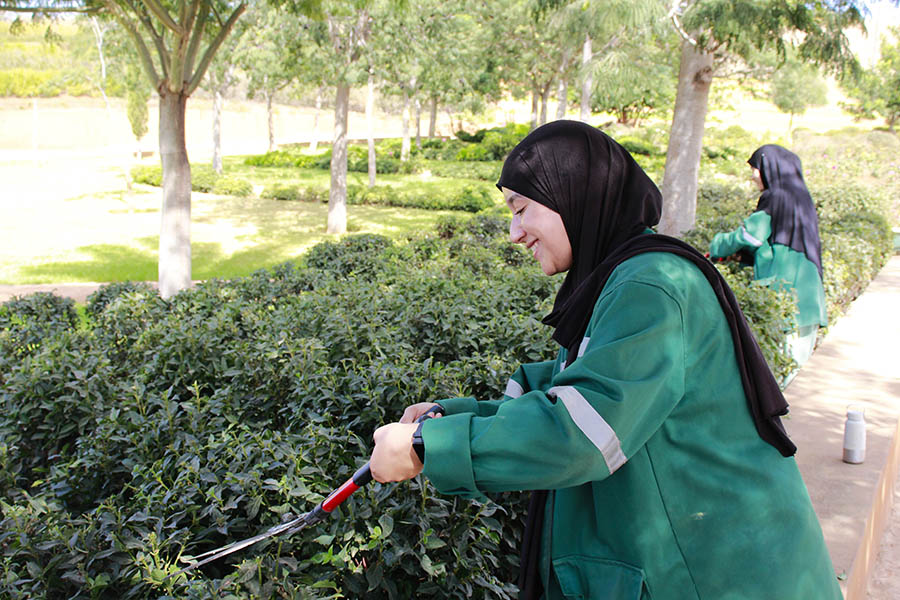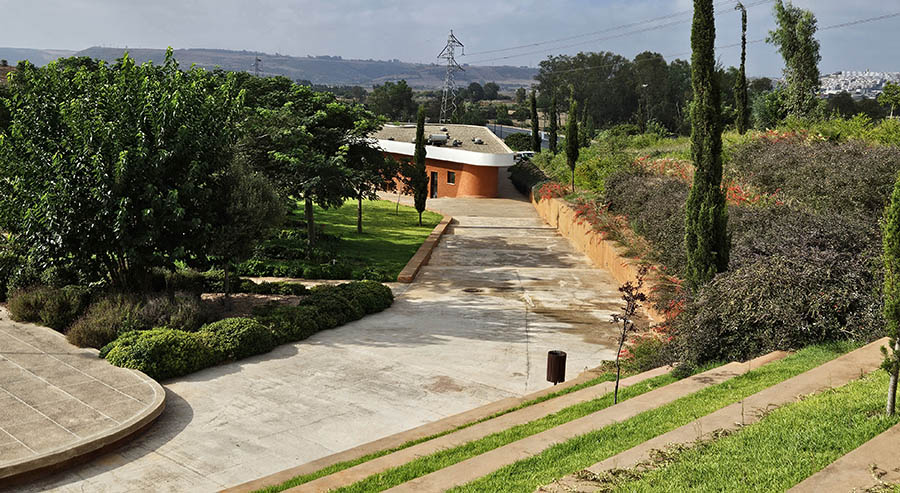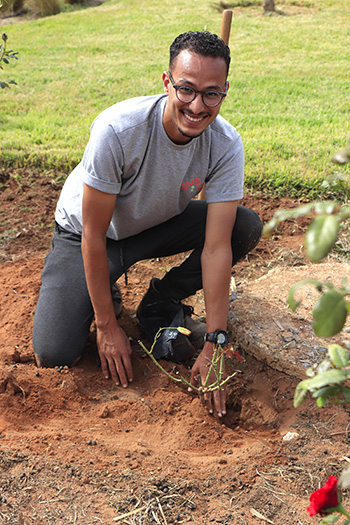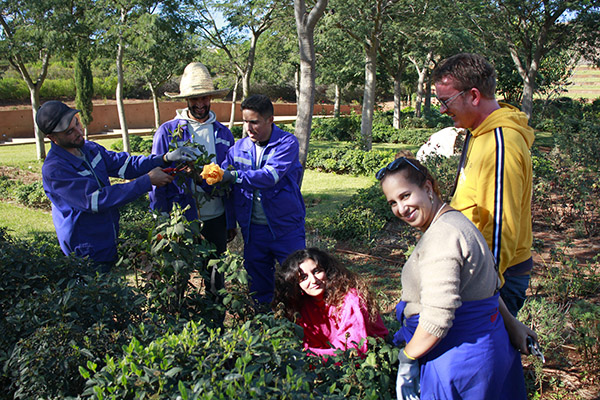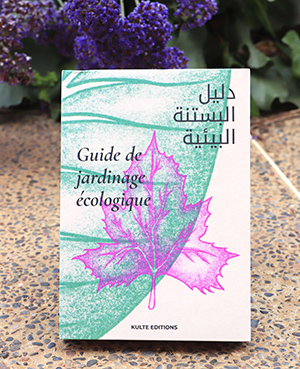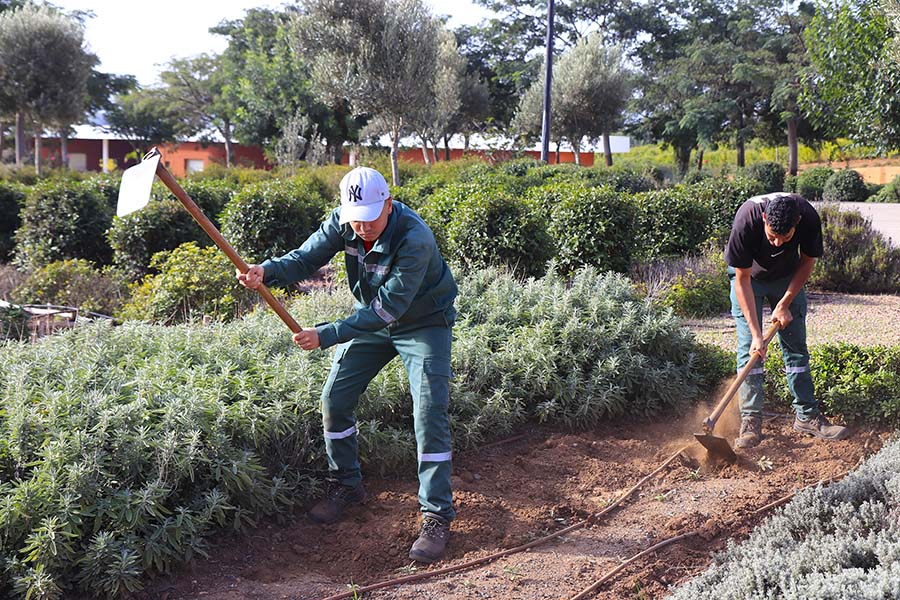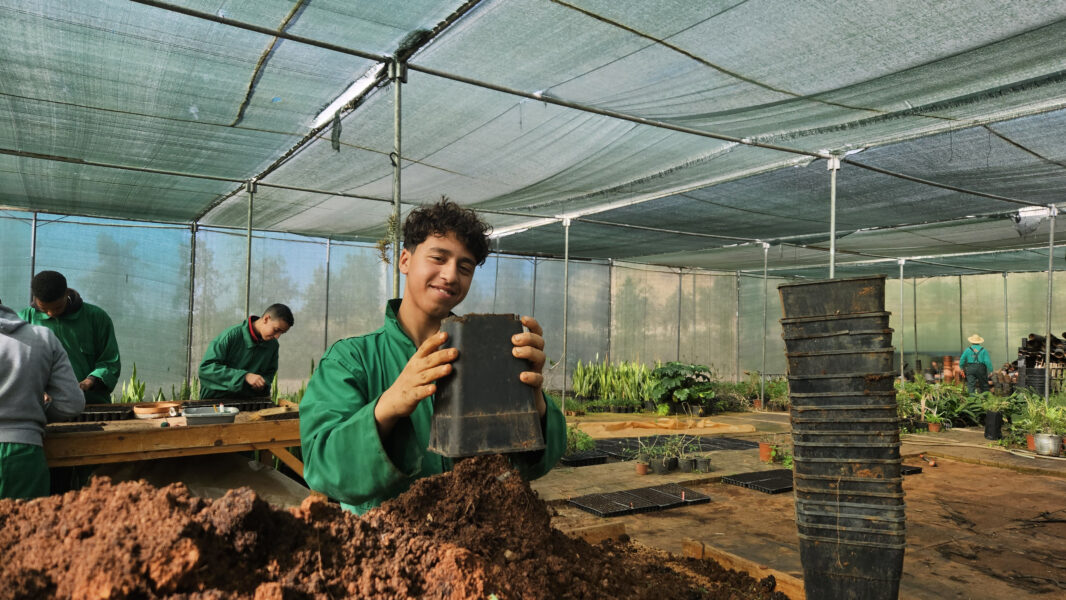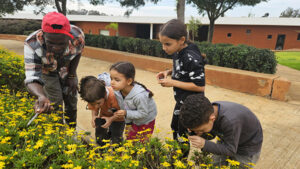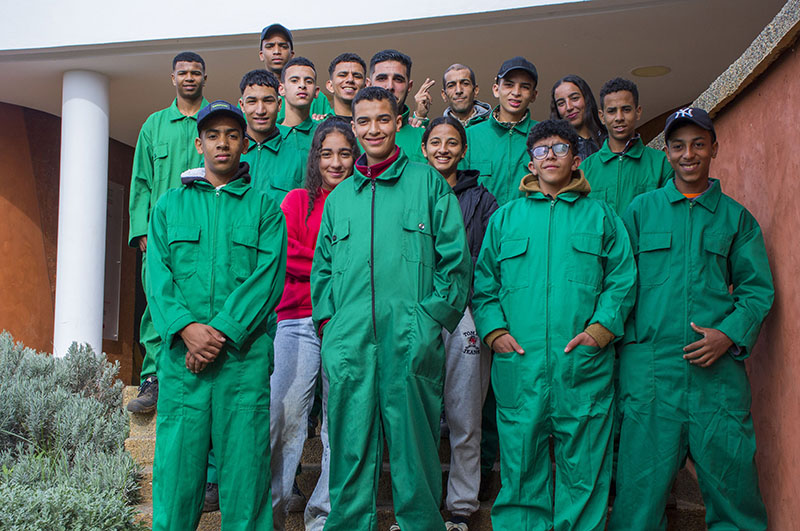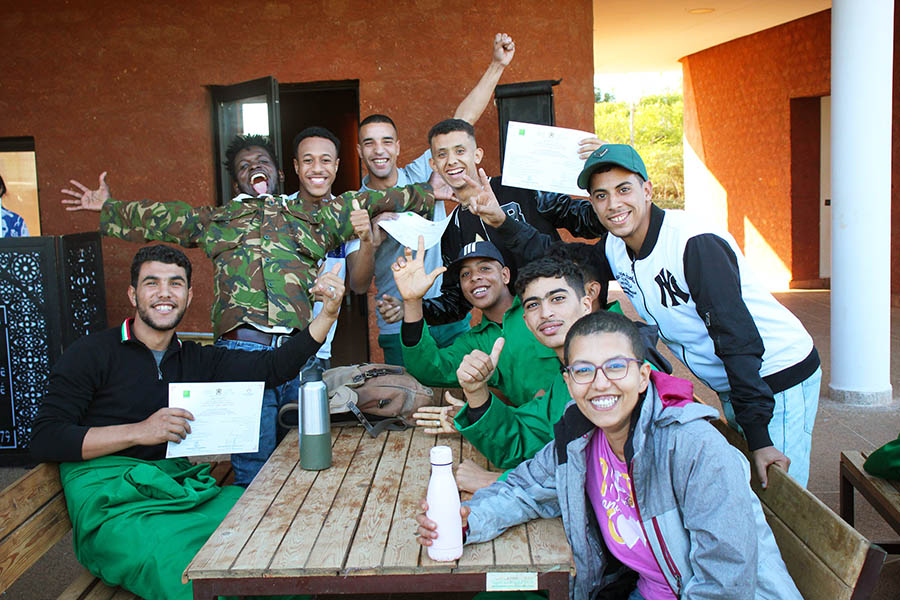Much has changed and evolved since the opening of the Med-O-Med gardening school in Salé, Morocco, in 2018. The park and the nursery have grown considerably and are flourishing despite water shortages and the juggling of sustainable resource management. The activities for the public have multiplied and, most importantly, the first generations of young graduates are now mostly professional gardeners working in good economic and social conditions. They have matured and have taken on a new working life with verve! The greatest satisfaction for those of us involved in this social and environmental project.
School creates bonds. Deep bonds between the trainers and the students, many of whom are still in contact with their teachers after some time has passed. Long-lasting bonds between the team; between those who are no longer there, because they returned to Spain after their invaluable work, and those who have been there since the beginning, today mostly Moroccans.
There is something special about this environment; peace, say some of those who visit us; a particular energy, say others. And this despite the small and inevitable daily conflicts between teenagers, many of them in difficult family or social situations.
There is something special about this environment; peace, say some of those who visit us; a particular energy, say others.
It is true that the eight hectares of the park, part of which is landscaped and part of which is occupied by the production nursery, offer a lot and expand the view and the senses. The orchard, the rose gardens, the wooded areas, the squares and the paths flanked by agaves and olive trees offer beauty and the joy brought by the groups of apprentices in their bright green overalls as they weed, compost, mulch, prune or plant, according to their level and abilities. Meanwhile, laughter and even applause sometimes escape from the classrooms.
It should be recalled that the school is an apprenticeship training centre recognised by the Moroccan Ministry of Economic Inclusion, Small Business, Employment and Opportunities – department of vocational training -, that the training is spread over three years crowned by a diploma; that it consists of 20% theory and 80% practice, and that this is mostly done in the school’s park and nursery, although some tasks can be done outside.
Training and vocational integration
As every year, a diagnosis of the project and an action plan for the new academic year 2024-2025 have been carried out, which are always accompanied by an in-depth reflection on the things that have worked and those that need to be implemented. One of the issues, since it is the pillar of the project, is the improvement of training and subsequent job placement. To this end, the school has launched the creation of specialisation modules in floral art, a trade that is underdeveloped in Morocco and yet in great demand. This specialisation, together with gardening and agro-ecology, which is also part of the educational programme, constitutes an additional employment opportunity for the young graduates.
School creates bonds. Deep bonds between trainers and pupils, many of whom remain in contact with them after a long time.
Training is also being organised for future monitors in environmental education, which is also in great demand in associations and schools. In fact, Iman Baghari and Abdellatif Sasy, both students of the school’s first graduating class, have specialised in this subject and give workshops and training to the monitors of the Jardin Majorelle in Marrakech, as well as to young people with diverse abilities from the AMSAT and Kariat associations, who share their bustling comings and goings through the park with the school’s trainees, twice a week.
Otherwise, summer internships in a professional environment and occasional external gardening services help young people to improve their work skills and to earn some income, thus contributing to the meagre family economy.
Replicability and innovation
During the last school year and during this new school year, several innovative actions have been launched. Among others, the gradual replicability of the project in relation to ecological practices and techniques applied in the school. Training courses for professionals in gardening and agro-ecology have been organised and, this autumn, these have been extended to include floral art, given by the company Végétal Concept, and biological control using allied insects, given by the agronomist Albdelhak Rizqi.
Training courses for professionals in gardening and agro-ecology have been organised, and this autumn these have been extended to include floral art.
The first ecological gardening guide in Arabic and French, written by landscape gardener Carey Duncan in collaboration with the school’s trainers and published by Kulte, has also been published. A beautifully edited and illustrated reference work, it is intended primarily for Moroccan trainers in training and any gardener with some experience.
Awareness-raising and income-generating activities
We must not forget that the school is not only that, but also a public space for relaxation and environmental and cultural awareness. In recent months we have had the pleasure of having as speakers such interesting figures as Bouchra Baibanou, one of the first Arab climbers to have climbed Everest, who spoke about her impressive life experience and presented her book ‘Mon chemin vers le sept sommets du monde’. We also had, among others, Léon Buskens, director of the Netherlands Institute in Rabat, who gave a successful presentation on the heritage and patrimonial policies of Rabat and Salé.
Among the income-generating activities, essential for the school’s progressive economic autonomy, the main one continues to be the sale of plants from the production nursery, which has grown considerably and increasingly specialises in native and endemic Moroccan species, better adapted to climate change and in demand by quite a few landscapers and gardening companies. The collections in the wild throughout Morocco have increased, and so Pablo G. Watson, sometimes accompanied by a specialised botanist, Professor Fakir, and Adam, a young assistant in the nursery – also a former student of the school – obtain and acclimatise such interesting species as Juniperus phoenicia and oxycedrus, and numerous bulbs of Iris tingitana, Narcissus tazzeta and Scilla peruviana, among many others. The increasingly frequent exchange of genetic material through the Med-O-Med network is noteworthy, as is the academic and scientific aspect of the collaborators who interact with the school on a voluntary basis.
To contribute to the marketing of the nursery plants, a catalogue of the school’s plants has been published this year, as well as a thorough market study.
The rental of the school’s spaces, multi-purpose rooms, pergolas and so on, continues to be another of the most useful resources for the economic sustainability of the project, as well as the numerous educational school visits from public and private schools, and the organisation of workshops in general. The trainees are systematically involved, interacting closely with the public and acquiring social skills.
This autumn and winter, the Sunday market of certified organic and SPJ food products is now a reality, thanks to an agreement signed with the Ferme BioShoul cooperative.
This autumn and winter, the Sunday market of certified organic and SPJ food products is now a reality, thanks to an agreement signed with the Ferme BioShoul cooperative. An activity that brings not only excellent fresh and processed food to the public, but also joy and entertainment to the school, also on weekends, when the café-restaurant Azafrán also opens its doors and brings its know-how. Gradually, the flea market will also be expanded with quality handicrafts and natural cosmetics.
Challenges and ambitions
Among the things we have had to implement for a greater optimisation of energy and natural resources are the repair and improvement of the solar energy system that feeds the enclosure, as well as the sectorisation and renovation of the irrigation system. An investment that is undoubtedly costly, but necessary.
But training and apprentices remain the beating heart of the school and the biggest challenge. Avoiding absenteeism and dropping out of school, often due to family pressure and a poorly rooted culture of effort, remains a challenge. However, it is gratifying to note that girls are increasingly numerous (and generally more serious) in a field traditionally considered to be masculine. This is why the personalised attention that has always been given to all of them from the classroom, social mediation and management, is essential to the harmony of the project. Seeing the young people mature and grow during the three years of continuous training more than compensates for the efforts made.
Another challenge remains the financing of such a complex project. For this, we must once again thank the valuable support of the INDH (National Initiative for Human Development); the Regional Council of Rabat, Salé and Kenitra; the AECID (Spanish Agency for International Development Cooperation); the Drosos Foundation, the FAI Foundation, the Luciole Foundation – Institut de France, the French Embassy in Morocco and the transport company ALSA Maroc, among the main ones. We also hope to continue to count on your help and the aid of other institutions and actors, to ensure the permanence over time of this structuring and beautiful project.
Fundación de Cultura Islámica
Photographs by Inés Eléxpuru, Anouar Oudra
This post is available in: English Español

